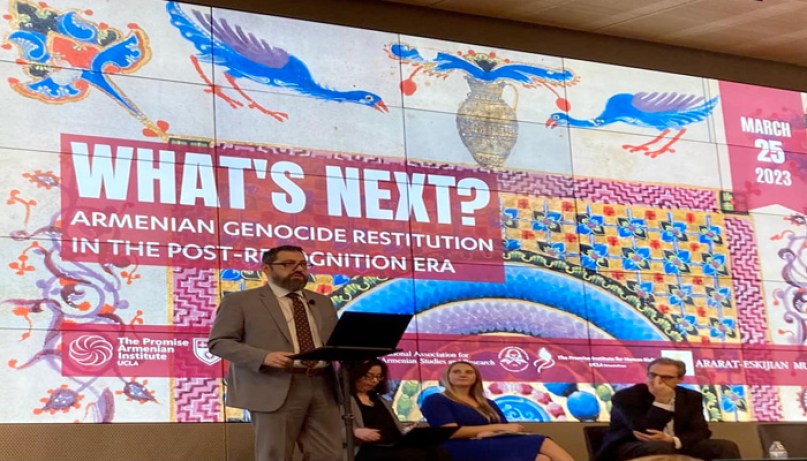UCLA. We are nowhere near out of these dark woods, but a path to restitution and reparation must be sought, even in darkness. Karing Kerkonian writes on his Facebook Page.

I spoke on cultural appropriation at #UCLA a few weeks ago. The subject is yet another painful fold in the book of genocide trauma that continues, almost unabated—and, today, displays in full color to those who care to see. New wounds, sliced and cut upon still open wounds.
I stressed the power of attribution as a legal tool, and its pressing relevance right now in #Artsakh. Azerbaijan’s path to erase our people from native land is paved with narratives seeking to justify unimaginable acts of inhumanity. The playbook, we know all too well.
We must confront these narratives now, I explained, and we must do so with powerful resolve, unrelenting force, and with a sense of duty. To be left commemorating genocide unfinished is simply unspeakable torment upon still unspeakable torment.
I spoke from historical example and, painfully, a myriad of present ones, illustrating how Azerbaijan’s narratives are specifically engineered not only to render Armenians foreigners on their own land, but to clear disgusting pathways to ethnic cleansing, to annihilation and to genocide—to make the undeniably inhumane somehow palatable to humanity.
Narratives of alienation and dehumanization always preview a slaughter by the sword. They try to justify it. They are the red flags. We, more than any others, should smell it in the air. And we must combat these narratives at every turn, always and everywhere. Human lives continue to hang in the balance where words are allowed to waft in the unattended stench of hatred—just as they did a century ago, half a century ago, two years ago … and just as they will tomorrow, if we allow it.
Thank you to Professor Taner Akcam for the invitation to present at UCLA at this critical juncture; indebted to Garo Ghazarian, Arman Tatoyan, Saro Kerkonian, and the «Թաթոյան» հիմնադրամ/ “Tatoyan” foundation for their valuable contributions to the arguments and evidence; and gratitude again to Liz Mirza Al-Dajani and Ani Nazaryan for helping refine, reshape, and target the words.
